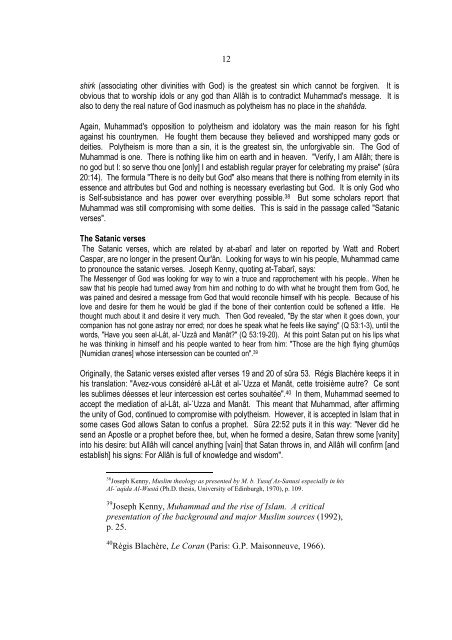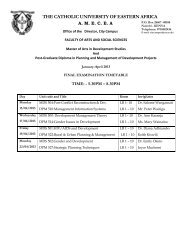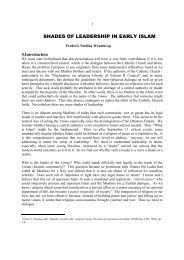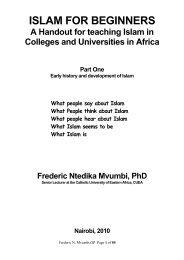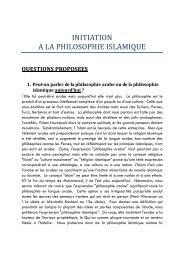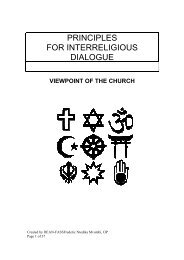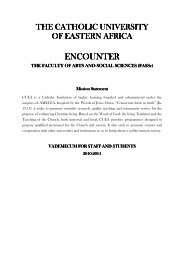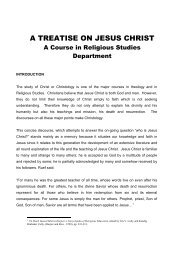INTRODUCTION TO ISLAMIC THEOLOGY.pdf - CUEA
INTRODUCTION TO ISLAMIC THEOLOGY.pdf - CUEA
INTRODUCTION TO ISLAMIC THEOLOGY.pdf - CUEA
You also want an ePaper? Increase the reach of your titles
YUMPU automatically turns print PDFs into web optimized ePapers that Google loves.
12shirk (associating other divinities with God) is the greatest sin which cannot be forgiven. It isobvious that to worship idols or any god than Allâh is to contradict Muhammad's message. It isalso to deny the real nature of God inasmuch as polytheism has no place in the shahâda.Again, Muhammad's opposition to polytheism and idolatory was the main reason for his fightagainst his countrymen. He fought them because they believed and worshipped many gods ordeities. Polytheism is more than a sin, it is the greatest sin, the unforgivable sin. The God ofMuhammad is one. There is nothing like him on earth and in heaven. "Verify, I am Allâh; there isno god but I: so serve thou one [only] I and establish regular prayer for celebrating my praise" (sûra20:14). The formula "There is no deity but God" also means that there is nothing from eternity in itsessence and attributes but God and nothing is necessary everlasting but God. It is only God whois Self-subsistance and has power over everything possible. 38 But some scholars report thatMuhammad was still compromising with some deities. This is said in the passage called "Satanicverses".The Satanic versesThe Satanic verses, which are related by at-abarî and later on reported by Watt and RobertCaspar, are no longer in the present Qur'ân. Looking for ways to win his people, Muhammad cameto pronounce the satanic verses. Joseph Kenny, quoting at-Tabarî, says:The Messenger of God was looking for way to win a truce and rapprochement with his people.. When hesaw that his people had turned away from him and nothing to do with what he brought them from God, hewas pained and desired a message from God that would reconcile himself with his people. Because of hislove and desire for them he would be glad if the bone of their contention could be softened a little. Hethought much about it and desire it very much. Then God revealed, "By the star when it goes down, yourcompanion has not gone astray nor erred; nor does he speak what he feels like saying" (Q 53:1-3), until thewords, "Have you seen al-Lât, al-`Uzzâ and Manât?" (Q 53:19-20). At this point Satan put on his lips whathe was thinking in himself and his people wanted to hear from him: "Those are the high flying ghurnûqs[Numidian cranes] whose intersession can be counted on". 39Originally, the Satanic verses existed after verses 19 and 20 of sûra 53. Régis Blachère keeps it inhis translation: "Avez-vous considéré al-Lât et al-`Uzza et Manât, cette troisième autre? Ce sontles sublimes déesses et leur intercession est certes souhaitée". 40 In them, Muhammad seemed toaccept the mediation of al-Lât, al-`Uzza and Manât. This meant that Muhammad, after affirmingthe unity of God, continued to compromise with polytheism. However, it is accepted in Islam that insome cases God allows Satan to confus a prophet. Sûra 22:52 puts it in this way: "Never did hesend an Apostle or a prophet before thee, but, when he formed a desire, Satan threw some [vanity]into his desire: but Allâh will cancel anything [vain] that Satan throws in, and Allâh will confirm [andestablish] his signs: For Allâh is full of knowledge and wisdom".38 Joseph Kenny, Muslim theology as presented by M. b. Yusuf As-Sanusi especially in hisAl-`aqida Al-Wustâ (Ph.D. thesis, University of Edinburgh, 1970), p. 109.39 Joseph Kenny, Muhammad and the rise of Islam. A criticalpresentation of the background and major Muslim sources (1992),p. 25.40 Régis Blachère, Le Coran (Paris: G.P. Maisonneuve, 1966).


